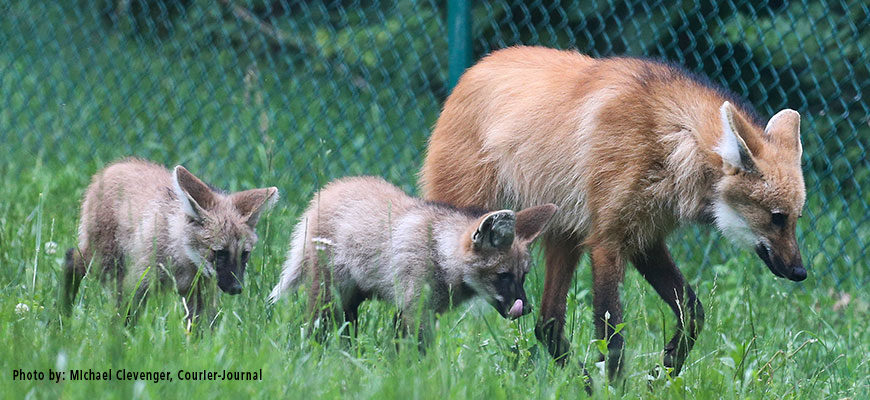CONTACT: Kyle Shepherd
Direct: 502-238-5331 | Media Only: 502-744-5639
kyle.shepherd@louisvilleky.gov
The Louisville Zoo’s newest maned wolf pups have officially been named, thanks to our guests’ input in an online voting contest. The winning names were “Cora and Catina.” Cora is short for Coração, meaning “heart” in Portuguese and was submitted by zoo keepers because the pups were born on Valentine’s Day. Catina is a Portuguese name for girls meaning “pure,” though zoo keepers will likely call the wolf “Cat” for short.
Vincent Smith of Louisville was drawn randomly as our grand prize winner from all of those who voted for the winning set of names. He will receive a behind-the-scenes tour.
The five sets of names that were originally submitted by the maned wolf zoo keepers for public vote included “Marcelle and Angela,” “Ginger and Ruby Rudy,” “Winona and Tahshah,” and “Ramona and Beatrice.” The pups were born to wolves Sadie and Rocko and were their first offspring together. Each pup weighed seven pounds at the time of their neonatal examinations. The two pups are the first maned wolf pups for the Louisville Zoo in ten years.
ABOUT MANED WOLVES
The maned wolf is native to South America and can be found throughout Brazil, Paraguay, Argentina, Bolivia, Peru and Uruguay. Though maned wolves are generally solitary, during the breeding season they come together in semi-monogamous pairs. The maned wolf is an omnivore: half of their diet is fruit supplemented with small mammals, birds and reptiles, insects, nuts, eggs and grass. The IUCN Red List of Threatened Species lists the maned wolf as near threatened.
***
The Louisville Zoo, a non-profit organization and state zoo of Kentucky, is dedicated to bettering the bond between people and our planet by providing excellent care for animals, a great experience for visitors, and leadership in scientific research and conservation education. The Zoo is accredited by the American Alliance of Museums (AAM) and by the Association of Zoos and Aquariums (AZA).
###

